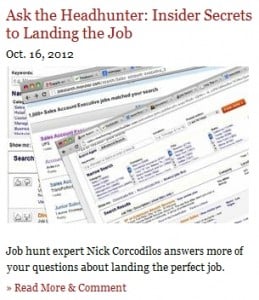In the October 23, 2012 Ask The Headhunter Newsletter, a job hunter asks about bait-and-switch contracts used by “staffing” firms.
A recruiter at an IT staffing firm did something that I think is very unethical. I signed a contract with the firm to perform IT duties at a company where I successfully interviewed just days before. It specified the hourly pay and overtime.
I verbally negotiated the rate prior to signing the contract. Unfortunately, I did not ask for a copy of the contract. Yesterday, the recruiter asked me to sign more forms. There was a new contract, and a significant reduction in pay! The overtime was deleted and the pay was stated weekly instead of hourly.
When I pointed this out, the recruiter e-mailed that, “We lost the original contract.” I called the next morning, and the recruiter insisted I sign the new forms and said she would take care of my concerns. When I balked and declined to sign, she said they would redo the forms but it might be a day or two. Meanwhile, I’m supposed to start work tomorrow!
I find this utterly distasteful and unethical. I’m going to wait and see if the recruiter comes up with the correct terms before I contact the staffing account manager or the company I’m supposed to work for.
My question is, why are they stalling with the new contract? Why couldn’t it be immediately corrected? Maybe they are waiting to find something in my background check so they can report to the company that I am “unsuitable” for hire. Then, they can go out and find someone cheaper. What do you suggest?
Nick’s Reply
What you’re describing is, unfortunately, not uncommon in the IT “staffing” or “consulting” biz. (It’s not just the IT field that uses staffing firms.) These companies recruit and hire people, then “rent” them to their client companies at a profit. Things like this happen because overly-eager recruiters get excited when they find a candidate like you. They want to sign you up and assign you to a client, so they promise you a contract that’s to your liking. Later, the sales rep handling the account you’d be assigned to can’t get the rate the recruiter promised you — so the deal changes. It’s a classic bait-and-switch game.
It is crucial that you read everything before you sign, and make sure everything you negotiated is in the written contract.
No matter what you negotiated and they agreed to orally, what matters is what’s in the written contract. Make sure you get the counterpart of the contract — the copy they signed — and tell them you will not report to work until you receive it. Often, a firm will demand that you sign the contract, then they will “forget” to give you the copy they signed.
The games some of these companies play are unethical — but they do it anyway. Your protection is to insist it’s in writing, and to politely but firmly decline to show up for work until the written contract is to your satisfaction.
But be careful. If you sign something without reading it carefully, and then you decide you want different terms, too late — you’re already committed. Be very, very careful. Good contracts make good working relationships.
 One tactic they may use is to ignore your requests right up until the last minute, maybe the day you’re supposed to show up for work. This puts you on edge and makes you very nervous. You want the job, but you don’t want the terms. They figure you will cave to get the work, so they will push the envelope hard and far. Unless you have a history of good experiences with them, don’t believe anything until it’s in writing in your hands.
One tactic they may use is to ignore your requests right up until the last minute, maybe the day you’re supposed to show up for work. This puts you on edge and makes you very nervous. You want the job, but you don’t want the terms. They figure you will cave to get the work, so they will push the envelope hard and far. Unless you have a history of good experiences with them, don’t believe anything until it’s in writing in your hands.
You may really need the job, but you must decide in advance whether you will accept lesser terms or such behavior. Then stay calm, don’t complain, don’t get angry. Just state your terms. Your overriding strategy must be to make yourself highly desirable or indispensable to the consulting firm. Make them need you. Then make your reasonable demands calmly and firmly. Then let them decide, and let them reveal whether they are honest and have integrity.
You’re doing the right thing. This can be risky, but you must decide your tolerance for such risk: If they want to play the last-minute game, you can play, too. Just know what you’re doing in advance, and let this play itself out. If they don’t give you the contract you agreed to, then stop working with them. They’re not honest.
Be careful if you go to the actual employer to discuss this. Do not say nasty things about the firm. Be businesslike. It can be as simple as this:
How to Say It
“I enjoyed meeting with you, and I’d like to work on your team. However, I’m not happy with the way the consulting firm has handled the facts of the project. Is there another consulting firm you use that you respect? Can you recommend someone there that I can talk to?”
Not all companies will answer you — they get nervous. They may even have a contract with the staffing firm that prohibits them from discussing this with you. But you must decide whether integrity is important enough to kill a deal. In the end, you may need to meet a new staffing firm, and a good way to do that is to talk with a company where you’d like to work, and inquire which staffing firm they use. There are some very good staffing firms out there: Get a personal introduction to them, and learn to igore the rest. Get a personal introduction.
As more companies try to avoid the fixed overhead of staff, they’re going to look to hire “on contract.” Do you see this trend in your own business? Have your experiences with staffing firms been good or bad? What would you do in a situation like this? What methods do you use to avoid problems and to get a good deal from staffing firms?
: :














